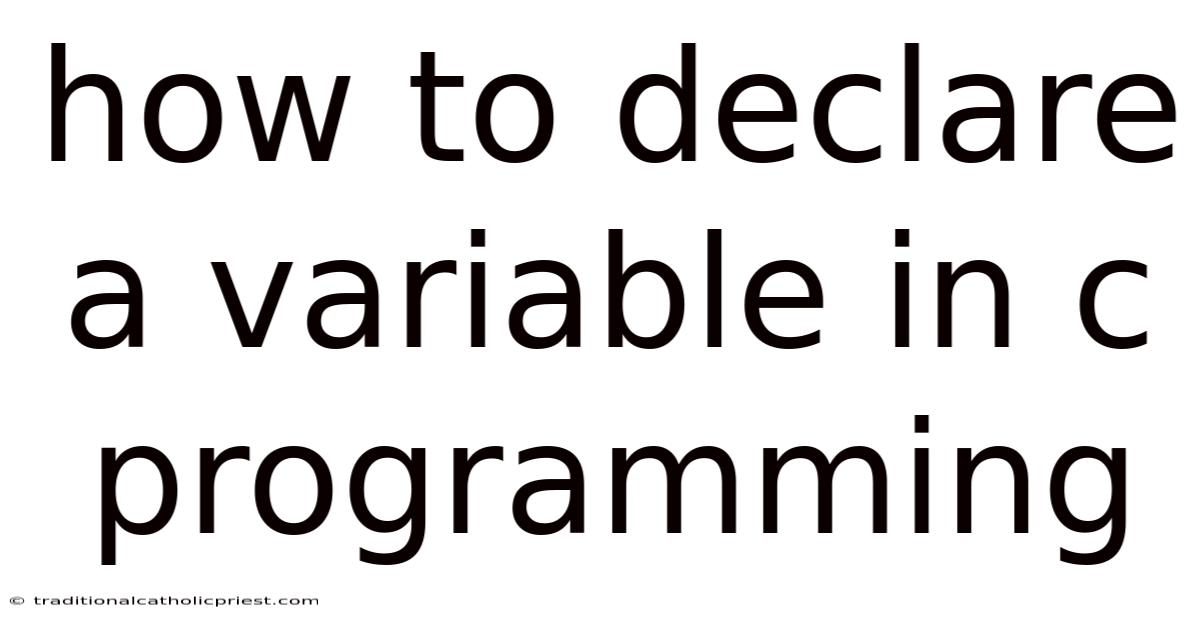How To Declare A Variable In C Programming
catholicpriest
Nov 24, 2025 · 12 min read

Table of Contents
Imagine you're organizing a toolbox. Before you can store a wrench or a screwdriver, you need to label a specific drawer or compartment. Declaring a variable in C programming is much the same: it's reserving and naming a space in your computer's memory to hold a particular piece of data. Without this initial declaration, your program wouldn't know where to store the information it needs to function, leading to errors and unpredictable behavior.
Understanding variable declaration is the bedrock of C programming. It's more than just memorizing syntax; it's about grasping how your program interacts with the computer's memory. The process involves specifying the type of data the variable will hold (integer, floating-point number, character, etc.) and giving the variable a unique name so you can refer to it later. This foundational concept unlocks the door to building dynamic and functional programs, allowing you to manipulate data, perform calculations, and create interactive experiences for users. Let's delve deeper into the world of C variable declarations and uncover its nuances.
Main Subheading: Understanding Variable Declaration in C
In C programming, declaring a variable is akin to reserving a parking spot in memory for a specific type of data. Before you can use a variable to store information, you must explicitly declare it. This declaration informs the compiler about the variable's name, the type of data it will hold (such as an integer, a floating-point number, or a character), and, consequently, the amount of memory to allocate for it. Without a proper declaration, the C compiler won't know how to handle the variable, leading to compilation errors.
The declaration of a variable plays a pivotal role in the overall structure and functionality of a C program. It's not merely a syntactic requirement, but a way to ensure type safety and efficient memory management. By specifying the data type, you're essentially telling the compiler to enforce rules about the kind of values that can be stored in that variable. This helps prevent unintended errors, such as trying to store text in a variable intended for numbers. Additionally, the declaration helps the compiler optimize memory usage, allocating just enough space for each variable based on its declared type.
Comprehensive Overview of Variable Declaration
Definition and Purpose
A variable declaration in C is a statement that introduces a variable to the compiler. It specifies the variable's identifier (its name) and its type (e.g., int, float, char). The purpose is to reserve a specific memory location to hold values of the declared type. This allows the program to store, retrieve, and manipulate data during runtime.
Syntax of Variable Declaration
The general syntax for declaring a variable in C is as follows:
data_type variable_name;
Where:
data_type: Specifies the type of data the variable will hold (e.g.,int,float,char,double).variable_name: Is the identifier or name you give to the variable. This must follow C's naming rules (start with a letter or underscore, contain only letters, numbers, and underscores, and not be a reserved keyword).
Examples:
int age; // Declares an integer variable named 'age'
float price; // Declares a floating-point variable named 'price'
char initial; // Declares a character variable named 'initial'
double pi; // Declares a double-precision floating-point variable named 'pi'
Data Types in C
C offers a variety of built-in data types, each designed to store different kinds of information:
int: Used to store whole numbers (integers) without decimal points (e.g., -10, 0, 25).float: Used to store single-precision floating-point numbers (numbers with decimal points) (e.g., 3.14, -2.718).double: Used to store double-precision floating-point numbers, offering greater precision thanfloat(e.g., 3.14159265359).char: Used to store single characters (e.g., 'A', '7', '
Latest Posts
Related Post
Thank you for visiting our website which covers about How To Declare A Variable In C Programming . We hope the information provided has been useful to you. Feel free to contact us if you have any questions or need further assistance. See you next time and don't miss to bookmark.